Labyrinth was Jim Henson’s second collaboration with artist Brian Froud, following The Dark Crystal four years earlier. Labyrinth was clearly a very different, more expansive type of project; Henson and Froud were joined by George Lucas as executive producer, Monty Python’s Terry Jones wrote the screenplay, and rock demigod David Bowie signed on to star, as well as write and perform the movie’s soundtrack.
Whereas The Dark Crystal is often seen as Henson and Froud’s freewheeling homage to fantasy àla Tolkien, Labyrinth is much more structured and far more aware of its influences; it’s also wonderfully allusive and meta at points, filled with references to the Brothers Grimm, Hans Christian Andersen, L. Frank Baum, Lewis Carroll, Maurice Sendak, and Walt Disney. And yet the movie doesn’t limit itself to clever references — it’s very clearly participating in the classic tradition of works like The Wizard of Oz, the Alice books, and Where the Wild Things Are, in which a young protagonist escapes a humdrum existence into an exotic, sometimes threatening, alternative reality.
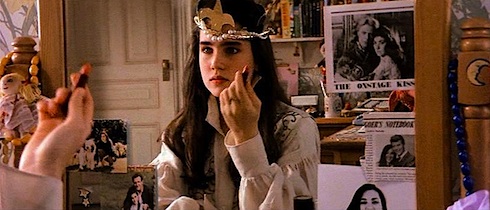
The film opens with our teenaged protagonist, Sarah, lost in her own little world, preferring to hang out in costume reciting plays in the park than she is in “normal” teenaged stuff like dating. The first ten minutes of the movie do a stellar job of setting up Sarah as the heroine of her own suburban fairy tale, the put-upon Cinderella who stomps her way huffily through interactions with her more-exasperated-than-evil stepmother and nice-but-clueless dad. It’s a tribute to Jennifer Connelly’s performance that Sarah manages to exhibit all the hyper-dramatic martyrdom of your average 16-year-old while still seeming sympathetic and likeable — it’s easy to identify with her in the same way that we identify with Alice, or Dorothy Gale, or Sendak’s Max.
Perhaps on some level, the petty tyrannies of bossy adults, no matter how well-meaning, are always going to strike a chord with anyone who’s ever been a kid. In spite of Sarah’s mini-tantrum over having to babysit her baby brother (played by young Toby Froud, whose parents met while working on The Dark Crystal), it’s hard to blame her for feeling unappreciated and angry at not having any say in the matter…except that she is, unexpectedly, given her say. By none other than Mr. David Bowie.
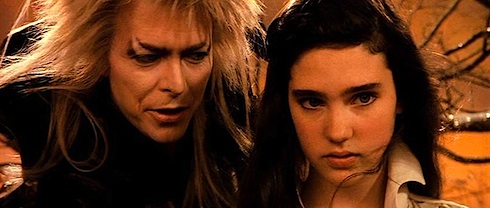
Well, technically, Sarah’s wish is granted by Jareth the Goblin King, who happily complies with her request to spirit the screaming Toby away to his castle, to her immediate regret. She demands that Jareth return the baby, and when she refuses to accept his gifts or be swayed by his arguments, he leaves her at the titular labyrinth, telling her that she has thirteen hours to solve it and rescue her brother, or Toby will remain with the goblins forever. Confidently, even cockily, Sarah sets off on her quest, but soon finds that her expectations thwarted at every turn.
She is consistently frustrated by the bizarre, whimsical, through-the-looking-glass logic of the labyrinth and its inhabitants, fails to ask the right questions, acts on her assumptions rather than facts. She learns the hard way that faeries bite, and that a good many other things in the labyrinth are not what they seem to be. As a friendly worm tells her early on, “You can’t take anything for granted,” and Sarah soon internalizes that advice, learning to think for herself, accepting that she won’t always get her way, facing up to the fact that reality isn’t going to bend itself to her whims. The labyrinth is nothing but a continuous series of choices, but as Sarah finds herself in control of her destiny, she soon realizes that choices can be a tricky, and all decisions have inescapable consequences.
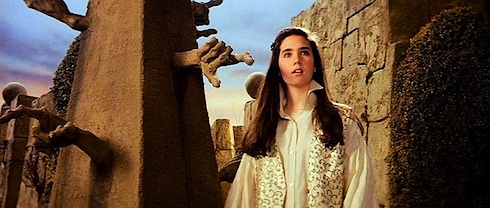
She also begins to make friends along the way, but even that isn’t easy. Sarah’s first companion on the journey is a dwarf named Hoggle, and their relationship is forged through a complicated process of distrust, bonding, betrayal, guilt, and redemption: Girl meets Goblin-like creature, Girl is disgusted by Goblin-like creature and his craven, fairy-killing ways, Goblin helps Girl after girl bribes Goblin, Goblin abandons Girl, then saves her, then double crosses her by means of a spiked peach, finally learns to be heroic and is forgiven. Like everything else in this film, friendship and trust is anything but simple; it’s a learning process, with ups and downs, and entails risk as well as reward.
Meanwhile, as Sarah makes her way through the labyrinth (as well as the series of epiphanies and life lessons lurking around every corner), Jareth watches her progress with increasing displeasure, pouting on his throne while sporting a riding whip and high-heeled boots, as goblin kings are wont to do, and occasionally performing a baby-juggling musical number. As much as I’m tempted to make fun of Bowie’s over-the-top performance (and costumes. And wig and makeup), I actually think he was a brilliant choice for the role. If we think about Labyrinth as a commentary on the role of fantasy in the modern world, a kind of updated fairy tale for the late 20th century, who better to embody the lure of the fantastic than a rock star, especially as one as otherworldly as Ziggy Stardust himself?
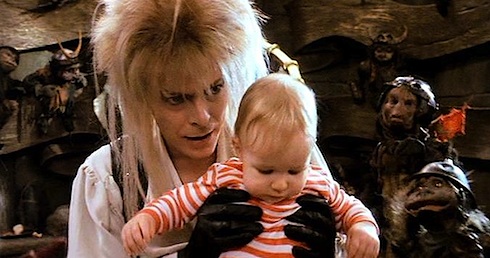
Characters like the Goblin King, or my own personal favorite fairy tale villain, the Snow Queen, tend to represent an unsettling mix of childhood fantasies and adult fears and desires; they draw their would-be victims in through a disturbing blend of infantilization and seduction. Throughout the movie, Jareth attempts to distract Sarah with baubles and gifts, and when that fails, he simply tries ordering her around: “Sarah, go back to your room. Play with your toys and your costumes. Forget about the baby.” Unable to deter her, he has Hoggle slip her the aforementioned poisoned peach, spiked with some sort of potent magical Goblin-roofie.
The resulting hallucination finds Sarah in the midst of what my friends and I always refer to as “Goblin Prom”: dressed in a very grown up, gorgeous ball gown and gloriously big hair, Sarah makes her way through a claustrophobic masquerade ball filled with vaguely threatening masked dancers and Bowie/Jareth, in his best formal glam Goblin King finery. As the soundtrack swells, the sexual undertones of the masquerade are unmistakable — Sarah is clearly the innocent, suffering the smirks and laughter of the debauched, almost predatory revelers swirling around her. She’s the only one not wearing a mask, since even Jareth hides behind several disguises as he quasi-stalks her through the crowd.
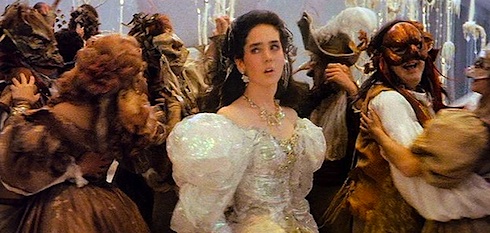
Finally, he reaches her; they begin to dance and as he sings to her, we realize that this is, undeniably, a seduction scene…and something is very wrong. Fighting her way back to reality, Sarah realizes that her time (and Toby’s) is running out, and, in what is simultaneously the worst special effect and the most punk rock moment in the entire film, smashes her way out of Bowie’s smarmy, sexy, smirky distraction-bubble. It’s an amazing sequence — beautiful and unsettling and creepy, and her rejection of Jareth in the scene is powerful precisely because of the uncomfortable juxtaposition of Connelly’s youth and innocence and the much-older Bowie’s rock star magnetism and sinister allure.
The film tends to oscillate between these strategic attempts to distract Sarah by appealing to more selfish, childish desires on one hand and more adult, exotic freedoms on the other. This makes sense the more we realize that the Goblin King is entirely Sarah’s own creation — her belief in him brings him to life, gives him his power, and he needs her imagination and innocence to survive, but she is not prepared to have her whole identity squeezed into an obedient, docile package as a naïve little girl, and not as the prospective Mrs. J. Goblin King, either.
In their final showdown, Jareth offers to fulfill all of Sarah’s dreams, for a price, telling her, “I ask for so little. Just let me rule you, and you can have everything you want.” It’s clear at this point that Sarah must make a choice between the occasionally unpleasant uncertainties and unfairness of life in the real world, or surrender herself to her fantasies by giving up her free will, agency and power, and she barely hesitates before answering, “You have no power over me.” BOOM. Game over, Major Tom.
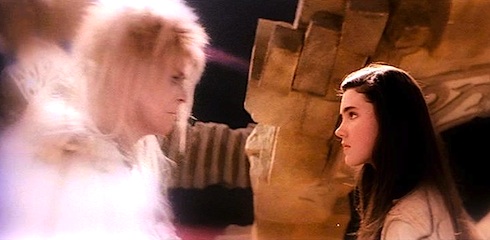
With that one line, balance is restored. Sarah and Toby find themselves safely back at home, and while Sarah is relieved to be back, the movie takes the extra step of assuring her (and the audience), that the world of the labyrinth will always there if she needs it. This has always been one of my favorite aspects of Labyrinth — as much as I see it as a continuing the great coming-of-age-through-fantasy tradition of classic children’s literature, the last scene reassures us that fantasy isn’t necessary meant to be shut out or ignored, any more than reality is. There’s no black and white here: in real life as in the labyrinth, it’s impossible to be a slave to logic. Reality has room for the irrational and the fantastic — life should be a healthy mix of both, and clinging to either extreme is problematic — rejecting reality, or completely rejecting fantasy and imagination are equally unacceptable, by the movie’s reasoning.
I’ve always thought of Labyrinth as the anti-NeverEnding Story — where the power of imagination eventually trumps all in the latter, Labyrinth is all about the balance between the real world and imagination, and about finding joy in both. It’s a sentiment that runs throughout all of Jim Henson’s career, but I’ve always seen it most clearly, here, in his tribute to all the great works of imagination that inspired him along the way.
There are so many amazing things I haven’t had a chance to mention in this film — the truly wonderful script, replete with delightful, Pythonesque touches, the fabulous characters (Ludo! Sir Didymus!), the gorgeous design and puppeteering—but I’m aware that some people love this movie, and others think it’s ridiculous, and there are people in both camps that completely dismiss it as anything but pure camp. And I just have to say that I could not disagree more — I adored Labyrinth as a little kid, and even more as a teenager, then throughout college and I still love it now as an adult, for many, many reasons. But the reason I love it most is that it features a headstrong young female protagonist taking on the world in jeans and sensible shoes.
If that doesn’t sound like much to you, then take into account the fact that the movie revolves around Sarah’s refusal to be treated as a princess (a word never once used in the script). One of the things that this movie does brilliantly is systematically reject the usual “princess” trope — Sarah’s happy ending isn’t going to be found on the arm of some fantasy heartthrob; her adventures in the labyrinth force her to abandon any such princess-y delusions. Her identity is her own, and she isn’t about to be swayed by any bedazzled, leather-loving, tight-panted gigolo with a castle, even if he is some sort of king.
It’s an incredibly subversive approach to the usual fantasy heroine that seems to go unnoticed in the midst of all the muppetry and cleverness and stunning visuals, but to a kid raised on Disney and mediocre sitcoms, it was simply revolutionary, camp or no. In the end, Sarah was allowed to be exactly who she wanted to be — not a child, not an adult, but very much her own person all the same. Labyrinth is a movie about learning to think differently, learning to think for oneself, regardless of people’s expectations, and even more impressively, it’s also a film that practices what it preaches. For that reason, I think that even Alice and Dorothy and Max would agree that this film is, and always will be, a classic.
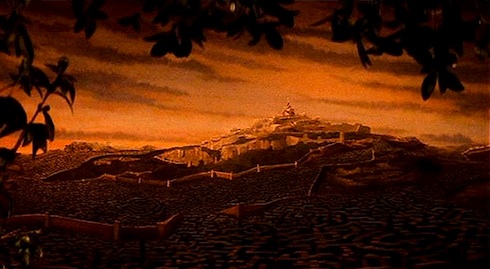
Bridget McGovern is already writing another post about this movie for Bowie Week…coming sooner than you’d think. Also, she would like to apologize to her three younger siblings for repeatedly trying to get the goblins to come and take them all away. Especially since it never worked.










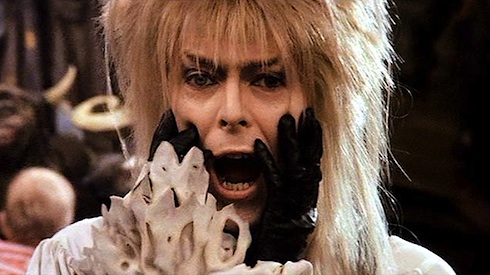
I love this movie too. The only part I have never truly enjoyed was the dance of the fire fairies. Or whatever they were. It always looked like someone’s hallucination to me.
But yes, an excellent movie with wonderful underpinnings of good stuff to learn subliminally.
I saw this movie in the theater when it first came out, with my then-teenage daughters so I have to have been in my early 40’s. Loved it then, still love it at age 64 (one of those former teenagers gave me the Dark Crystal/Labyrinth DVD set, I have wonderful children), never quite got why until I read this very excellent review.
The article makes me want to dig out my DVD copy and watch it.
So from that perspective, its entirely successful :)
It breaks my heart that I saw The Dark Crystal and Labyrinth in theatres when they were released, and thought that I would be able to watch films like that all my life.
Instead of which Jim Henson died and we got Michael Bay.
One of my all-time favorites! I even had the little record + read-along book set as a kid (wish I knew where it was now). I have to admit that I also am guilty of trying to wish my babysitting charges away to the goblins. :)
Yes, yes, yes, and thank you! I’ve loved this movie my entire life, too, for all the same reasons. :~D
@1, dwndrgn, I’m with you: the only part of the movie I don’t enjoy at all is the entire fire-creature bit. The song is irritating, the dance annoying, and the whole thing just doesn’t fit.
Everything else is BRILLIANT. So many tropes to bust, so little time!
And I agree completely, Bridget, that the single best part about the whole thing is that she does it in jeans and sensible shoes. I noticed that the first time I saw it, and I’ve loved that detail ever since. She’s not unfeminine, at all: she’s just well-prepared.
I’m still wont to imitate Ludo when something pongs: SMELL BAAAAAD.
@@@@@ Yatima
So true.
Hi, this was a fantastic, thoughtful and well written article – I loved it, it’s always nice to see people showing appreciation for Labyrinth. I thought I’d put this out there for any uber-fans, I’m working on a wiki dedciated to the film that has over 80 pages. You might want to take a look and even consider contributing-
http://labyrinth.wikia.com/wiki/Labyrinth_Wiki
What an excellent post. I enjoyed the movie way back when it came out, but now I feel the need for another watch, and the near certainty that I’ll get more out of it this time.
And this time I have a young daughter who I don’t want to turn into a princess (I don’t think she wants to either). Perhaps we should watch it together.
The only thing I dread seeing again is Bowie’s awful musical performance. For someone who grew up on Bowie the rock god the music in this movie is… difficult.
Dear Bridget,
How on earth did you get inside my head to write exactly what I think about this movie? That’s an amazing trick.
I watched this on Netflix with my 5-yr-old daughter about six months ago, and was disappointed that it wasn’t her favorite. Then she told me her favorite was that one with the flying girl and the scary birds who guarded the tall diamond. I figure, as long as she’s on a Henson track, I’m okay with that.
Great piece!
I don’t know why, but I found Jennifer Connelly completely insufferable in this film — not her character, but the actress herself, who I just don’t think could act very well at the time. She’s gotten much better since then, to be sure.
And the enduring image I have from it is the scene involving Escher’s Relativity brought to life. I mean, that is just so cool. I remember spending — well, far too much time staring at that engraving and imagining walking up and down and around those stairways….
Thanks for the kind words, everybody–I’m glad you guys all remember this movie as fondly as I do (for the most part)–and by “remember fondly,” I guess I really mean “have maintainted a slight obsession with for the last 25 years” :)
It’s funny–the Firey puppets were always my least favorite part, too; I’m not sure why, but that scene never really seemed to fit in with the rest. Fun fact, though–Elmo puppeteer Kevin Clash performs Firey #1 (as well as one of the Four Gaurds and the voice of Ambrosius), and if you listen for him, you can definitely hear his very Elmo-esque voice during the Firey song. Not that I’m the world’s biggest Elmo fan or anything, but Clash is an interesting guy (and the subject of a new documentary), so it’s kind of fun to recognize his work when it pops up in Labyrinth.
For the same reason, I love knowing that Warwick Davis was part of the Goblin Corps–you can’t tell which one, obviously, but he’s in there somewhere, being awesome. Or that Sarah’s dad (Christopher Malcolm, best known for Absolutely Fabulous) was the very first Brad Majors in the original stage production of Rocky Horror. Man, I love this movie!
This is a fantastic analysis of the film! I always identified with Sarah because of her fantasy-obsession – evern her bratty moments :-) – and I love that the movie doesn’t end with a total leaving-behind of the fantasy world as only acceptable for children. And I’d never thought of it this way before, but in that final confrontation scene, the blurriness of Bowie and the background symbolizes very well that it’s all part of Sarah’s imagination – and that she’s finally able to distinguish the Labyrinth as a fantasy instead of letting it become her whole reality.
“It’s a tribute to Jennifer Connelly’s performance that Sarah manages to exhibit all the hyper-dramatic martyrdom of your average 16-year-old while still seeming sympathetic and likeable.”
About as “likeable” as any teen drama queen, i.e., not very.
Sarah is 14, not 16.
That was a wonderfully articulate rendering of things that make up my instinctive love and appreciation for this movie and its themes. I’ll just add one tiny thing – you make the excellent point that Sarah is, significantly, never labelled a “princess” in the film, and never goes for the swept-off-her-feet option … I wonder if there’s anything to her actual name – Sarah being one of the better-known etymologies, and that one princess….
I also enjoyed the extra subtlety of how very atavistic Sarah’s temptation in the end is made – her own mother, obviously idolized in absentia, chose to walk out on her family for a life of glamour and a sexy co-star (also Bowie) – and Sarah is offered exactly that fantasy. Sins of the mother …
@Nerija S–Thanks! And for what it’s worth, Bowie’s lyrics in this scene (to the song “Within You”) also seem to reflect the idea that Jareth is utterly dependent on Sarah, that she holds all the power, etc.
@bbbbb–IMDB states that Sarah is 15, I’ve read 16 in a lot of places, and apparently Connelly was about 14 when they started filming, so it’s kind of a toss-up.
@Pika–That is *fascinating*! I was not aware that Sarah means “princess,” but that’s incredibly helpful, and interesting…also, I agree with you about the implicit parallels between Sarah and her mother, but I was never quite sure whether to read her as absent or dead. As a child, for some reason I assumed that her mother had passed away, although it’s never addressed in the actual movie (and looking back, I may have to blame this on Disney as well, since they’ve killed off more parents than the Black Plague). Your analysis makes more sense (and is much more intriguing :)
I watched this for the first time a couple of months ago. I thought it was slow and boring and dumb.
There’s just one little correction I wanted to make: The Neverending Story was NOT about the triumph of fantasy over reality. Much like this movie, it was about finding a balance: about knowing the difference between stories and lies, and about being able to see wonder and mystery in the real world.
The misconception generally comes about because of the fact that the original movie only did the first half of the book. In the actual Neverending Story, Bastian’s quest to get himself back home after saving Fantasia is just as long as Atreyu’s story, and is arguably far more important to the message of the book.
Sorry to interrupt what was a very good discussion of Labrynth, but Neverending Story is one of my favorites, and I need to defend it whenever possible.
@19, well, thanks for dropping by to give us your Very Important Opinion about how crap this is. I’m sure we’ll all reconsider what we’ve loved for twenty-five years in response.
@Lsana–yes, thanks for catching that; I meant to make it more explicit that I was referring to the Hollywood version of The NeverEnding Story only, not the book (which I haven’t yet read, though I’m hoping to correct that shortly :) Mea culpa, and thank you for the clarification!
@BMcGovern
The novelization says that Sarah was 15, which as others have said seems like a nice ‘middle ground’ as Jennifer Connelly was 14 when the film was shot and nearly 16 when it was released :).
http://labyrinth.wikia.com/wiki/Sarah_Williams#Overview
CatieCat @@@@@ 21 – Why shouldn’t someone have a different opinion? And why shouldn’t they say so in public?
I like Labyrinth just fine, but I don’t mind living in a world where not everybody does.
teapot7, @24: Because what’s the point? Why go to all the trouble of leaving a comment, hitting the post button twice, just to pee on the parade? It reeks of entitlement, the idea that one’s opinion is so important that the thread would be incomplete without knowing that someone dislikes the property in question.
If everyone did it, the threads here would be utterly pointless: imagine if every one of us signed on to every thread for something we didn’t like, just to say we didn’t like it? Wouldn’t that mean that threads become endless vast wastelands of “I hate this”, with the occasional bump of “I didn’t!”?
It’s a given that more people dislike any given thing than like it. We could have inferred 19’s dislike by zie simply not commenting.
And no one’s parade gets peed on.
Thank you so much for this article! I agreed with everything you said and some of the commenters brought up some facts that I completely forgot about! I have been endeared to this movie since the first time I watched it as a child and to this day (33 years old) when I rattle off my list of all time favorite movies, it is still in the top 10. Brian, Wendy and Toby Froud are having an exhibit at the Animazing Gallery in NYC and are doing a book signing on December 3rd that my sister and I are going to attend! http://www.animazing.com/gallery/pages/2011FROUD/index.html
Thank you so much for this article! I agreed with everything you said and some of the commenters brought up some facts that I completely forgot about! I have been endeared to this movie since the first time I watched it as a child and to this day (33 years old) when I rattle off my list of all time favorite movies, it is still in the top 10. Brian, Wendy and Toby Froud are having an exhibit at the Animazing Gallery in NYC and are doing a book signing on December 3rd that my sister and I are going to attend! http://www.animazing.com/gallery/pages/2011FROUD/index.html
Took me a long time to realize that”…fantasy isn’t necessary meant to be shut out or ignored, any more than reality…”! What a great essay!
I saw this for the first time about 6 months ago. Based on all that I heard, I hoped that I would love it, but while I did find some great elements and potential in it, I felt that it really didn’t come together for me. Maybe it’s one of those films in which it makes a big difference how old you are when you watch it?
@29: AO, that makes sense as a possibility; nostalgia can be a powerful thing, and the movie is definitely a product of its period in several ways, which can work both for and against a media property (the same can be said for books and music, for instance).
What elements didn’t work for you? I know for me, the whole fire-fairy dance just never worked or fit in, partly because I really don’t like the song, but maybe also because they don’t feel like part of the Labyrinth as such, like the Bog and Ludo and Sir Didymus and Hoggle do.
@25 Cattie
You asked why I would comment that I didn’t like it, and why anyone would. Frankly, I didn’t for a few days of the post, but it was such a lovefest that it was annoying to me and I didn’t want anyone who came across the post later to think that everyone felt the same way. To me, it’s fairly obvious why this was not a particularly critical or financial success.
While playing in a labyrinth may be fun, it’s rather dull to watch. The tension may have been right for a small child, but there was no real sense of danger.
The Muppets themselves are a lot of fun to watch and laugh with but only Yoda has ever really worked in a movie for me. It’s one of the reasons I couldn’t enjoy Farscape that much.
David Bowie was pretty awful. Just being weird it not acting. Jen Connolly was fairly wooden and there was no meshing of styles.
If it was a favorite movie when you were a child, that is great. We all have fond memories of tv series and movies that we saw way back that take us home, but it doesn’t mean it was that good, just that it was good to us for that time and space.
Cattie @25: Bridget herself said that some people love Labyrinth while others hate it. Mr. Irish Mongol was the first to chime in with the latter opinion.
I can’t stand the movie, myself. But, like John (presumably), I didn’t see it until I was already an adult, and it sounds like a lot of the posters here saw it as kids. I’d be curious to see if there’s any correlation there.
SaltManZ @32: It’s definitely been my experience that those who don’t see the movie until adulthood (or until a few decades after it was made) generally don’t like it. For one thing, for all that the narrative is classic, the movie is very much a product of its time. If you first saw it when you yourself were immersed in that time, that wasn’t such an issue, and later nostalgia seems to continue to blunt the edges of the ’80sness. Still, the ’80sness is undeniable, and if you don’t have the benefit of nostalgia, I can easily see how that would be a hurdle that just could not be overcome.
I love Labyrinth, myself. I’m a woman only a year younger than Jennifer Connelly, so this movie came out at exactly the right time for me. I’ve also been a huge Bowie fan since I was in the single digits, but while I loved him in this movie and thought the soundtrack was both well-suited to the movie and quite catchy, I don’t think it can really be argued that it was among Bowie’s greatest musical creations.
But then, every proposed “classic” has flaws and detractors, which I think usually makes the piece in question more interesting, and there remains a dearth of “classics” with the theme of adolescent female empowerment.
Thank you so much for this beautifully written piece!
I should have spent this time researching papers, but I have been… perplexed regarding the Goblin King. ;)
Perhaps you could answer this due to your insight of the film of the Labyrinth itself:
Beyond his obvious outer surface attractions (image, voice and all), WHY does the appeal of the Goblin King endure- even now?
I KNOW that it cannot just be me. But I find it ever-increasingly disturbing that no other character, fictional or otherwise, captures my interest or attraction as much as this particular character. From theatre, poetry, novels,broadway shows, movies, and life… From pirate to knight, vampires to werewolves, detectives to villains, superheroes to archenemies, lovestruck gentlemen to the notorious rake, Cary Grant to Jude Law, fae to human- there is simply no comparism to the Goblin King. WHY???
I may be greatly biased, but I believe I have not found as many ENDURING and obsessed fans of a character in a film- composed of women of vastly different tastes -than I have encountered with the Goblin King in “Labyrinth”. It encourages me greatly, as I realize that I must not be the only freak out there- a girl who is just not attracted to anyone because they are just not Jareth.
It also increases my despair. If there are THAT many women that find the Goblin King so incredibly desirable, and all agree that there is NO one like him, what hope is there for any of us?
I have been hopelessly spoiled!